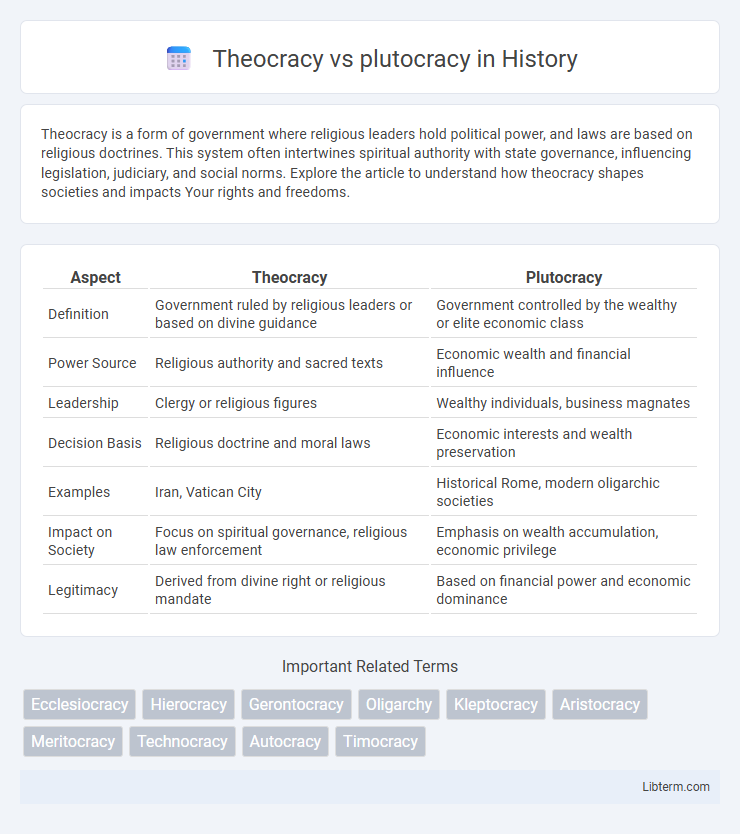Theocracy is a form of government where religious leaders hold political power, and laws are based on religious doctrines. This system often intertwines spiritual authority with state governance, influencing legislation, judiciary, and social norms. Explore the article to understand how theocracy shapes societies and impacts Your rights and freedoms.
Table of Comparison
| Aspect | Theocracy | Plutocracy |
|---|---|---|
| Definition | Government ruled by religious leaders or based on divine guidance | Government controlled by the wealthy or elite economic class |
| Power Source | Religious authority and sacred texts | Economic wealth and financial influence |
| Leadership | Clergy or religious figures | Wealthy individuals, business magnates |
| Decision Basis | Religious doctrine and moral laws | Economic interests and wealth preservation |
| Examples | Iran, Vatican City | Historical Rome, modern oligarchic societies |
| Impact on Society | Focus on spiritual governance, religious law enforcement | Emphasis on wealth accumulation, economic privilege |
| Legitimacy | Derived from divine right or religious mandate | Based on financial power and economic dominance |
Understanding Theocracy: Rule by Divine Authority
Theocracy is a system of government where religious leaders or institutions hold supreme power, guiding laws and policies based on divine authority and sacred texts. This form of rule merges political and spiritual leadership, often claiming legitimacy through a deity's mandate or religious doctrine. Unlike plutocracy, which bases control on wealth and economic influence, theocracy derives its authority from religious beliefs and divine guidance.
Plutocracy Explained: Power of the Wealthy Elite
Plutocracy is a form of government where power is concentrated in the hands of the wealthy elite, who influence policies and decision-making to protect and expand their economic interests. Wealth accumulation drives political authority, often leading to social inequality and limited access to resources for the broader population. This system contrasts with a theocracy, where religious leaders hold authority based on spiritual or divine guidance rather than financial power.
Historical Examples of Theocracies
Historical examples of theocracies include ancient Egypt, where Pharaohs were considered divine rulers, and the Papal States, governed by the Pope until the 19th century. In addition, Iran represents a modern theocracy combining religious authority with political power under clerical leadership. These examples contrast sharply with plutocracies like Renaissance Venice, where wealth and merchant families ruled without divine mandates.
Notable Plutocracies in History
Notable plutocracies in history include Ancient Rome, where wealth concentrated among elites influenced political power, and Renaissance Venice, controlled by rich merchant families who dominated governance. In modern times, influential plutocracies can be seen in the Gilded Age United States, characterized by industrial magnates controlling both economic and political spheres. These historical examples demonstrate how wealth accumulation enables elite groups to shape state policies and governance structures.
Governance Structure: Comparing Theocracy and Plutocracy
Theocracy centralizes governance around religious leaders and divine laws, with policies often derived from sacred texts and spiritual authority. Plutocracy, in contrast, concentrates power within the wealthiest individuals or families, prioritizing economic influence over ideological or spiritual guidance. Both systems prioritize elite rule but differ fundamentally in the source of legitimacy--divine sanction versus financial dominance.
Influence on Citizens’ Rights and Freedoms
Theocracy often imposes religious laws that can restrict individual freedoms, limiting citizens' rights to practice diverse beliefs and express dissent. Plutocracy centralizes power among wealthy elites, frequently leading to economic inequalities that undermine equal access to rights and political influence. Both systems compromise democratic principles but through different mechanisms: one by enforcing doctrinal conformity, the other by privileging financial power.
Economic Policies: Theocratic vs Plutocratic Systems
Theocratic economic policies prioritize wealth distribution aligned with religious principles, often promoting social welfare programs and ethical limitations on profit accumulation. Plutocratic systems focus on policies that favor the wealthy elite, emphasizing deregulation, tax advantages, and capital concentration to maximize economic control and influence. The contrast lies in the theocracy's value-driven economic interventions versus the plutocracy's profit-driven market dominance.
Social Inequality in Both Governance Models
Theocracy enforces social inequality through rigid religious hierarchies that dictate access to power and resources based on divine authority and doctrinal adherence. Plutocracy perpetuates economic disparity by concentrating wealth and political influence in the hands of the richest individuals or families, marginalizing lower-income groups. Both governance models institutionalize unequal social structures, with theocracy emphasizing spiritual legitimacy and plutocracy prioritizing monetary power.
Modern-Day Relevance and Challenges
Theocracy and plutocracy present distinct governance challenges in contemporary society, where the former merges religious authority with political power, often leading to restrictions on individual freedoms and minority rights. Plutocracy, characterized by rule through wealth concentration, exacerbates economic inequality and undermines democratic processes by enabling elite influence over policy. Both systems face criticism for limiting inclusive representation and social mobility in modern democratic contexts.
Theocracy vs Plutocracy: Pros, Cons, and Global Impact
Theocracy centralizes political power under religious leadership, often ensuring governance aligned with specific moral codes, but risks marginalizing dissenting beliefs and restricting freedoms. Plutocracy, where wealth dictates power, can drive economic growth by encouraging investment, yet it frequently exacerbates social inequality and undermines democratic principles. Globally, theocratic regimes influence cultural and religious policies, while plutocratic systems shape economic landscapes and contribute to polarized societies.
Theocracy Infographic

 libterm.com
libterm.com